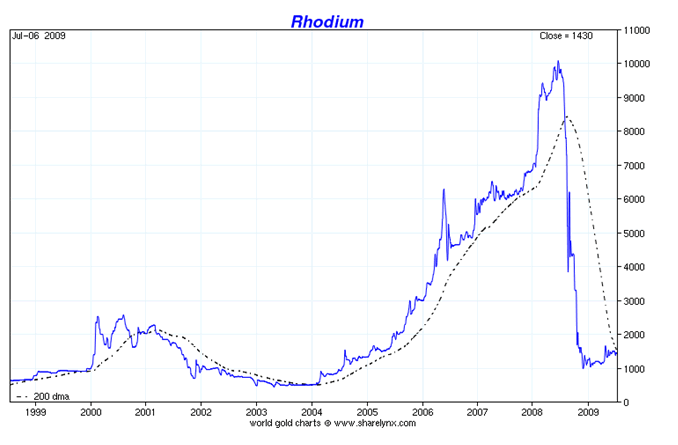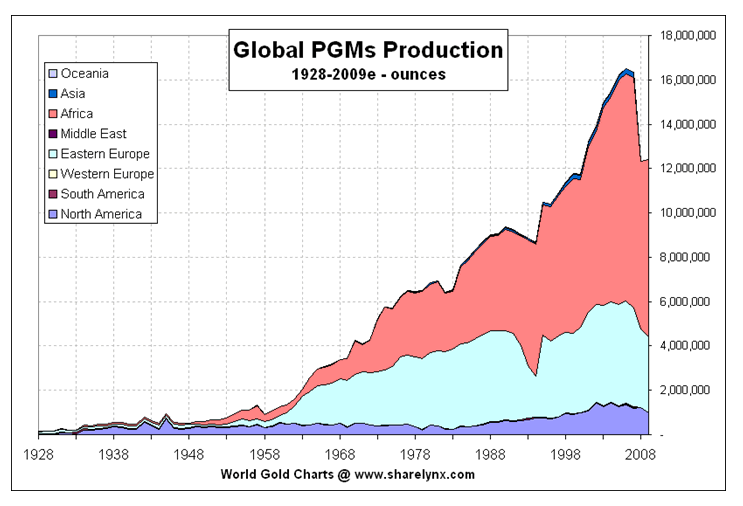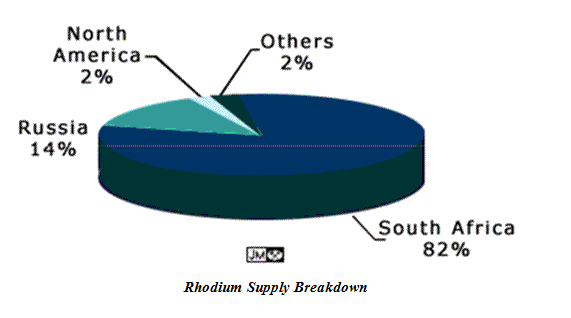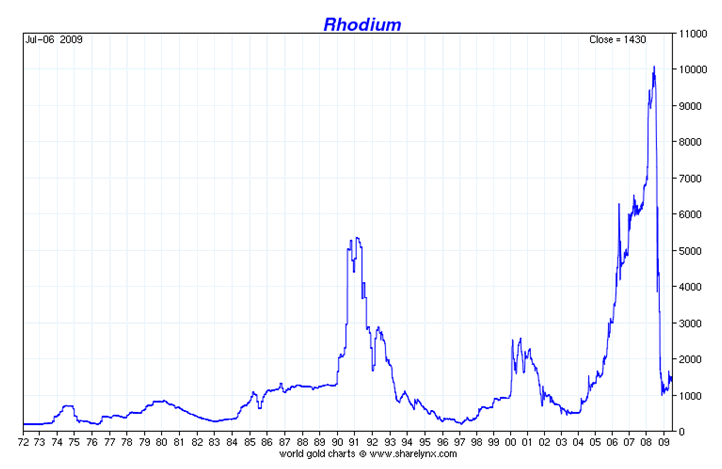Rhodium, The Most Precious Precious Metal?
Commodities / Rhodium Aug 24, 2009 - 01:32 PM GMTBy: GoldCore

 The Platinum Group Metal With Very Interesting Fundamentals
The Platinum Group Metal With Very Interesting Fundamentals
Introduction
While gold and it’s very attractive little sister silver have attracted the attention of some investors of late, there is a metal that is far, far rarer and has fundamentals that merit investment consideration. Some consider it the ultimate symbol of wealth—above and beyond gold, silver or platinum—because of its price and very significant rarity.
The metal in question is rhodium. Rhodium is only an infant compared to the ancient monetary metals of gold and silver. It was discovered along with palladium by British chemist and physicist William Wollaston in 1803. Together with platinum and palladium, rhodium belongs to the platinum group metals (PGM). Besides being a key component in the world automobile industry, some of rhodium’s other principal uses are in glass making and as a finish for mirrors and jewellery, in electrical connections and in aircraft turbine engines.
More recently, rhodium has been used for prestigious honours, or to symbolize wealth, when silver, gold, or platinum are deemed insufficient. Interestingly, the Guinness Book of World Records gave Paul McCartney a rhodium-plated disc for being history's all-time best selling recording artist and songwriter in 1979.

Price Performance
Rhodium’s price performance has been very volatile in recent years (see chart above and below). Its average price in 2003 was some $530/oz. Supply demand deficits led to a massive move up in price until 2008 when it briefly reached just over $10,000/oz.
Rhodium’s primary use is in catalytic converters in automobiles and with the sharp decline of the global automobile industry, the metal fell very sharply in price. It fell by more than 90% and today rhodium is trading at less than $1,600/oz.
Importantly, the average nominal price of rhodium over the last 40 years is some $1,500/oz which means that rhodium costs today not much more than its average price over the last 40 years (see chart below). And this despite a huge amount of rhodium having been used in industry and consumed during that period.
Supply Demand Fundamentals
Annual world production of rhodium is extremely small. Johnson Matthey estimated that rhodium supply in 2007 was 696,000 troy ounces and fell to 574,000 troy ounces (nearly 22 tonnes) in 2008. CPM, the respected precious metals consulting firm expect rhodium supply to be down 3.1% from last year. In comparison, the world production of gold has been around 2,500 tonnes per annum in recent years. Thus there is only roughly 1/100th the amount of rhodium produced annually as there is gold (rhodium’s annual production is some 1% of gold’s) and yet the price of rhodium is only some 50% more than gold (some $1,600/oz versus some $940/oz for gold).

Supply shortages contributed to rhodium price increases in recent years. This came about due to the massive consumption and demand by the automobile industry in the US, Europe and western world while supply remained anaemic at best. While demand for automobiles has fallen sharply in recent months, the world will need internal combustion engines for the foreseeable future. Catalytic converters require rhodium in order to reduce harmful emissions into the atmosphere. According to the International Herald Tribune, rhodium is expected to keep outpacing other precious metals in price as its need in diesel and non-diesel catalytic converters continues. Europe in particular has a high demand for rhodium, as 60 percent of all its automobiles are diesel-powered. Indeed, governments internationally are demanding stricter emissions standards in order to combat climate change. This should result in higher prices due to this demand.
The US automobile industry alone, was using more than half the world’s annual new supply of rhodium prior to the recent sharp fall in car sales. The growing importance of automobile industries in the large emerging markets such as Brazil, India, China and other Asia and Middle Eastern countries will likely soon become an important driving force in rhodium consumption and demand.
Resource Nationalism and Industrial Unrest Creates Supply Risk
With 82% of world rhodium supply coming from South Africa and 14% from Russia, resource nationalism could become an issue. Russia has been increasingly flexing its muscles on the world stage and has been using its gas reserves as geopolitical leverage. The Russians temporarily stopped palladium shipments in 2001 resulting in palladium surging in value.

South Africa has recently seen a change of government and there is a shift to the left in South African politics. The powerful mining trade unions are becoming increasingly militant and there have been calls for national strikes and nationalisation of mines. Not to mention the not insignificant matter of South Africa’s national electricity infrastructure being extremely poor. This has led to power outages and rationing of electricity and analysts warn of continuing significant risks to mine production from these power issues.
Resource nationalism, protectionism and the threat of nationalisation could lead to export duties and export controls being introduced and thus the supply of rhodium could be greatly hampered.
Extremely Rare Metal in a World of Dwindling Finite Resources
Scientists have acknowledged the reality that the world's finite natural resources, including its precious metals, are being used up at an unprecedented rate. The respected New Scientist has reported on it, especially in its 'Earth Natural Wealth: An Audit' report. The Wall Street Journal has also reported ( 'A Metal Scare to Rival the Oil Scare' ) how man's voracious demand for the earth's natural resources may lead to us 'running out' of some of them: "Scientists who have tried to estimate how long the world's mineral supply can meet global demand have made some gloomy predictions."
This is especially the case with the unprecedented elevation of billions of people in BRIC and other emerging economies moving from 'peasant class' to middle class in one of the greatest social and economic transformations the world has ever seen. While talk of “running out” of metals is hyperbole as there will always be recycling and limited production, the fall in the global production of rhodium should lead to higher prices.
In the same way that the phenomenon of peak oil has been recognised in recent years so too will the reality of peak metals and peak platinum group metals be realised in the coming years. This should lead to the price of the earth's precious finite metals rising to higher prices, possibly much higher.
Investing in Rhodium
Before investing in rhodium, people should realise that rhodium prices are quite illiquid due to the very small size of the market. . It is inadvisable to actively trade rhodium as its price movements are volatile. Thus a buy and decide to take profits at a pre determined level and or a buy and hold strategy would be advisable. Larger orders need to be placed over a period of days and weeks in order not to move the market and ensure a good average price.

Rhodium is a non exchange traded commodity and because it does not trade on the commodity exchanges it cannot be bought on margin like other commodities. Thus it cannot be bought using futures, exchange traded funds, contracts for differences (CFD’s), spread betting or other derivatives. Rather, investors must opt for the far more conservative and safer route of owning the actual physical metal itself rather than paper derivatives. Unknown to most, investors can buy rhodium in metal form from specialist bullion dealers and store it in depositories internationally.
Summary
Neither Wall Street nor the investment public is aware of rhodium and only a tiny handful of investors and institutions internationally have this extremely rare metal on their radar. Speculators have not bought rhodium and indeed most investors and speculators have not even heard of rhodium.
Rhodium is a hard tangible asset that has favourable supply demand fundamentals. Investors who own it stored in international vaults are not exposed to the current elevated systemic and systematic risk. Unlike companies, banks and governments, rhodium cannot become insolvent.
Rhodium is finite and the rarest of precious metals. In a finite planet with rapidly growing populations internationally and money printing and currency debasement on a scale not seen in modern times, rhodium is likely to at least preserve value in the coming years.
Thus, rhodium merits an allocation within the precious metals allocation of a properly diversified portfolio.
Bullion Services Team
IRL |
UK |
IRL +353 (0)1 632 5010 |
WINNERS MoneyMate and Investor Magazine Financial Analysts 2006
Disclaimer: The information in this document has been obtained from sources, which we believe to be reliable. We cannot guarantee its accuracy or completeness. It does not constitute a solicitation for the purchase or sale of any investment. Any person acting on the information contained in this document does so at their own risk. Recommendations in this document may not be suitable for all investors. Individual circumstances should be considered before a decision to invest is taken. Investors should note the following: Past experience is not necessarily a guide to future performance. The value of investments may fall or rise against investors' interests. Income levels from investments may fluctuate. Changes in exchange rates may have an adverse effect on the value of, or income from, investments denominated in foreign currencies. GoldCore Limited, trading as GoldCore is a Multi-Agency Intermediary regulated by the Irish Financial Regulator.
GoldCore is committed to complying with the requirements of the Data Protection Act. This means that in the provision of our services, appropriate personal information is processed and kept securely. It also means that we will never sell your details to a third party. The information you provide will remain confidential and may be used for the provision of related services. Such information may be disclosed in confidence to agents or service providers, regulatory bodies and group companies. You have the right to ask for a copy of certain information held by us in our records in return for payment of a small fee. You also have the right to require us to correct any inaccuracies in your information. The details you are being asked to supply may be used to provide you with information about other products and services either from GoldCore or other group companies or to provide services which any member of the group has arranged for you with a third party. If you do not wish to receive such contact, please write to the Marketing Manager GoldCore, 63 Fitzwilliam Square, Dublin 2 marking the envelope 'data protection'
GoldCore Archive |
© 2005-2022 http://www.MarketOracle.co.uk - The Market Oracle is a FREE Daily Financial Markets Analysis & Forecasting online publication.


